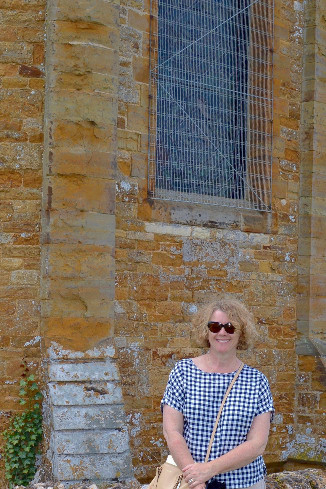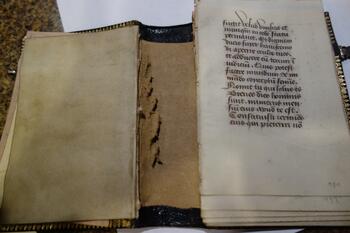Elaine Treharne earned her PhD from the University of Manchester, with a year as a Procter Graduate Fellow at Princeton University. She came to Stanford in 2012, after five years at Florida State, and fifteen years at the University of Leicester, where she had been Chair of the English Department, and interim Dean of the Faculty of Arts. She is a Fellow of the Society of Antiquaries, of the Royal Historical Society, and of the English Association; and has won grants from the Arts and Humanities Research Council, the British Academy, the NEH, the American Philosophical Society, and the Cyber Initiative. At Stanford, she is the Director of the Center for Spatial and Textual Analysis (CESTA) and Director of Stanford Text Technologies. She is a Fellow of the STS Interdisciplinary Program, and a Stanford Fellow 2017-2019.
Elaine’s research is focused on medieval British manuscripts from c.600CE to 1450CE. Numerous publications—including The Old English Life of St Nicholas and Wiley-Blackwell’s Old and Middle English: An Anthology (which is about to be published in its fourth edition)—present edited and translated texts, ranging from sermons and religious poetry to extracts from Beowulf and Chaucer’s Canterbury Tales. Other books and articles concern the prestige of the vernacular and the transmission of works in English from the late Anglo-Saxon period into the thirteenth century. This research has overturned previous scholarly opinion that held there to be little or nothing of value written in English between the Norman Conquest and the thirteenth century. In Living Through Conquest: The Politics of Early English, Elaine discussed the significant corpus of manuscripts that survive from this period, and highlighted the contemporaneity and political functionalism of many of the works copied by English scribes.
Her very recent work is focused on a
History of Text Technologies (with Claude Willan for Stanford University Press), which traces trends in the production and consumption of all forms of human communication from 30000BCE to the present day. And in
The Phenomenal Book, Elaine is focused on the interpretation of the handwritten book as an embodied whole (even where the only evidence is fragments and parts of books), which represents the traces and experiences of users and readers through time. It includes a chapter on ‘invisible things’, highlighting the sensual and emotional qualities of book production and use. She has also just completed the CyberText Technologies Project in CESTA—using historical patterns of textual facture and consumption to predict future text technologies; and she is just beginning a new digital project, Stanford Ordinary People’s Extraordinary Stories (SOPES), which recuperates the lives of otherwise unknown people whose ephemera (like letter collections, scrapbooks, notebooks, autograph albums, postcards, receipts, and photo albums) can be acquired from Ebay and bric-a-brac shops. Preliminary research shows that the amazing stories of people’s lives emerge from their written remnants.
Elaine’s teaching focuses on Text Technologies, Medieval English Literature, and the study of the Handwritten Book.



